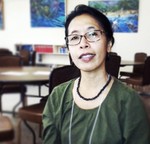For Farsijana Adeney-Risakotta, a Presbyterian Church (U.S.A.) mission co-worker in Indonesia for ten years, interfaith relations is hands-on engagement framed around hospitality and reconciliation.
Her context is a country with the largest Muslim population in the world, a place where she navigates through waters sometimes filled with Muslim-Christian hostility. “I have seen how religion plays a part… in violent action,” said Adeney-Risakotta, who was born in the chain of more than 13,000 islands.
Interfaith relations, then, involves creating a safe space where people can work through their feelings and ultimately dialogue with one another, she said.
Adeney-Risakotta was part of a consultation on interfaith relations held September 19–21 at Stony Point Center in New York. The gathering, designed to guide the Presbyterian Church (U.S.A.), was sponsored by the General Assembly Committee on Ecumenical and Interreligious Relations.
Adeney-Risakotta said she made a promise early on in her work to “keep working on the ground with the common people.” As a result, she and husband Bernie, also a mission co-worker and a resident in Asia for more than twenty years, intentionally opened their home for groups “to have a place for peace.”
In one instance, the couple brought together Christian orphans whose parents were killed in Muslim-Christian violence. Using music, dance, and art therapeutically, they and their church helped the children work through their trauma.
Our home became “a safe area where they could come and share themselves, their pain,” Adeney-Risakotta said.
A similar program was held for Muslim children, and eventually the two groups were brought together to fellowship and artistically create together. “It was very helpful because they needed that,” she said, adding that the blended group produced a dance together.
This kind of interfaith activism has led to other opportunities for cultural dialogue and reconciliation, and “now we are building institutionally,” Adeney-Risakotta said.
She lifted up, as an example, the Indonesian Consortium for Religious Studies, which includes Universitas Gadjah Mada, State Islamic University Sunan Kalijaga, and Duta Wacana Christian University.
“There is a longing for reaching out,” she said. “We need a space for people.”

